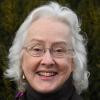
Contact Daphne
Daphne Lowell
413.549.4600

Daphne Lowell
413.549.4600
Daphne A. Lowell, professor emerita of dance and movement studies, and member of the Five College Dance Department, holds a B.A. in cultural anthropology from Tufts University and an M.F.A. in modern dance from the University of Utah.
She is co-founder-director of Contemplative Dance Workshops & Trainings with colleagues Alton Wasson and Mary Ramsay. They have taught professionals (artists, therapists, teachers, social workers, somatic practitioners, professional religious, hospice workers, physicians, and nurses) of all ages and from all over the country and abroad since 1989. They initiated and hosted the first international (2006) and first national (1985) gatherings of Authentic Movement teachers. Daphne has written several articles on Authentic Movement. Two of these, Authentic Movement and Authentic Movement as a Form of Dance Ritual are published in Authentic Movement: Moving the Body, Moving the Self, Being Moved, edited by Patrizia Pallaro (Jessica Kingsley Publishers, 2007). Others have been published in Contact Quarterly and A Moving Journal, and she wrote the entry on Authentic Movement for The Illustrated Encyclopedia of Body-Mind Disciplines edited by Nancy Allison (The Rosen Publishing Group, 1999).
Her choreography has been honored by being chosen for the statewide MassMoves Festival, and the Gala Concerts at the American College Dance Festivals. She also performs Contemplative Dance solo improvisations. Earlier in her career she toured nationally dancing and teaching with the Bill Evans Dance Company, and also taught dance on the faculty at Arizona State University, the University of Washington, and Smith College. She studied Authentic Movement with Janet Adler and Edith Sullwold in the Mary Starks Whitehouse Institute in 1982-83, Psychosynthesis with Dr. Tom Yeomans, and Body-Mind Centering with Bonnie Bainbridge Cohen.
Areas of interest in her teaching and advising, in addition to choreography and performance, include dance’s linkages with anthropology, religion, psychology, creativity studies, experiential anatomy, education, neuroscience, healthcare, and participatory or “applied” forms of dance. In recent years she has taught: modern dance technique, improvisation, composition and choreography, Dance and Culture, The Round Table: Research in Dance; Dance Advocacy: What’s Dance Got to Do with It? She has also developed courses in using Contemplative Dance: Moving Meaning: Contemplative Dance and other creative practices for health, wellbeing, and creativity; Embodied Imagination; and Sources of Creativity. She works to advocate for dance to become more recognized, accessible, and understood as the powerful, multiple, adaptable, intelligent, useful, and meaningful practice it can be.